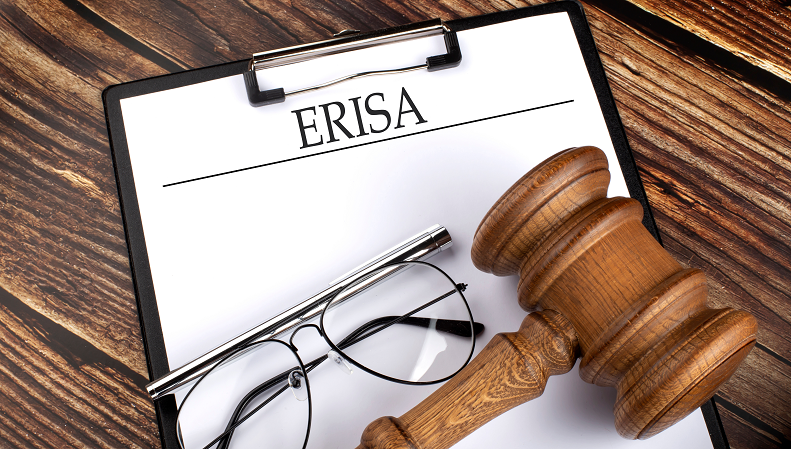Many employers offer robust benefits packages in addition to monetary compensation. Those benefits can be critical to ensuring your family’s health and financial security. If your benefits claim has been denied, it is essential to understand the applicable laws and damages available in ERISA litigation.
Table of Contents
What Laws Apply To Your Benefits Claim?
If you work for a private-sector employer that offers benefits on top of your salary, your benefits are likely governed by the federal benefits law called the Employee Retirement Income Security Act of 1974 (ERISA). Common examples of ERISA benefits include:
- Health insurance;
- Life insurance;
- Accidental death and dismemberment (AD&D) insurance;
- Long-term care (LTC) insurance;
- Short-term disability (STD) benefits;
- Long-term disability (LTD) benefits; and
- Retirement benefits, including from pension, 401(k), and 403(b) plans.
If you work for a government or church-related entity, your benefits are likely exempted from ERISA coverage. If you purchased your own insurance, your benefits are governed by state insurance law.
Related Article here: How Can I Tell if my Benefit Plan is Governed by ERISA
What Damages Are Available If Your ERISA Benefits Claim Is Denied?
If you apply for benefits under your employer-sponsored plan, but your claim is denied (in whole or in part), you must first submit an internal appeal to the insurance company and/or plan administrator. If the denial is upheld following the submission of your appeal, you will then have the opportunity to file a lawsuit. These cases are typically filed in federal court as claims for benefits under ERISA § 502(a)(1)(B) (29 U.S.C. § 1132(a)(1)(B)).
Even if you file a lawsuit, the damages you can recover are limited. If you are successful in court, the best outcome would be for the judge to overturn the denial of benefits and order the insurance company and/or plan administrator to pay you the benefits due through the present. If it is a monthly benefit claim (such as an STD, LTD, or retirement benefits claim), the judge cannot order the insurer and/or plan administrator to continue paying benefits indefinitely. The judge can only require that your claim be reinstated and that the benefit payments continue for as long as you remain eligible.
In addition to awarding benefits, the court can require payment of pre-judgment interest on the past due benefits. The ERISA statute also provides for fee-shifting under § 502(g) (29 U.S.C. § 1132(g)). In Hardt v. Reliance Standard Life Ins. Co., 560 U.S. 3 (2010), the United States Supreme Court found a court may award attorneys’ fees, at its discretion, to any party that achieves at least “some success on the merits.” That means that if the denial of benefits is overturned in court, the judge may order the other side to pay your reasonable attorneys’ fees from the litigation on top of the benefits due. Unfortunately, that does not apply to the pre-litigation appeals process, so attorneys’ fees cannot be awarded for any work performed by your counsel outside of court.
On the other hand, the judge may agree to overturn the denial of benefits, but remand your claim back to the insurer and/or administrator to review it again. Another alternative would be for the judge to uphold the denial of benefits, in which case no benefits or other damages will be awarded to you.
If Your ERISA Benefits Are Insured, Can You Pursue Bad Faith Damages?
It is common for state insurance laws to provide for additional bad faith damages when an insurance company deliberately violates its contractual obligations, including by refusing to pay a valid claim. The amount of bad faith damages available varies significantly from state to state.
Nonetheless, if you are pursuing a benefits claim under an ERISA-governed plan, you cannot seek any other damages besides the benefits due under your plan, as well as an award of pre-judgment interest and/or attorneys’ fees, at the discretion of the court. Unlike ordinary insurance litigation, extra-contractual bad faith damages are unavailable under ERISA. In Pilot Life Ins. Co. v. Dedeaux, 481 U.S. 41 (1987), the United States Supreme Court clarified that ERISA pre-empts state common law tort and contract causes of action because ERISA’s civil enforcement remedies are exclusive.
Are There Other Claims Or Damages You Can Pursue Under ERISA?
In addition to claims for benefits under ERISA § 502(a)(1)(B), plan participants frequently seek equitable relief under ERISA on behalf of the entire plan (under § 502(a)(2)) and/or for themselves (under § 502(a)(3)). Equitable relief may be sought when a claim for benefits is not available under the plan’s terms, or in addition to a claim for benefits, so long as the alleged injury and/or requested relief is not duplicative. Examples of equitable relief that is potentially available under ERISA include restitution, disgorgement of profits, promissory and equitable estoppel, declaratory judgments, injunctive relief, equitable reformation, and surcharge, which is another form of “make whole” monetary relief.
While the benefits available under ERISA may be limited, if you have a claim that has been denied, it is crucial that you consult with experienced benefits counsel like the attorneys at DeBofsky Law to ensure you collect the maximum amount of damages available to you under the law.







